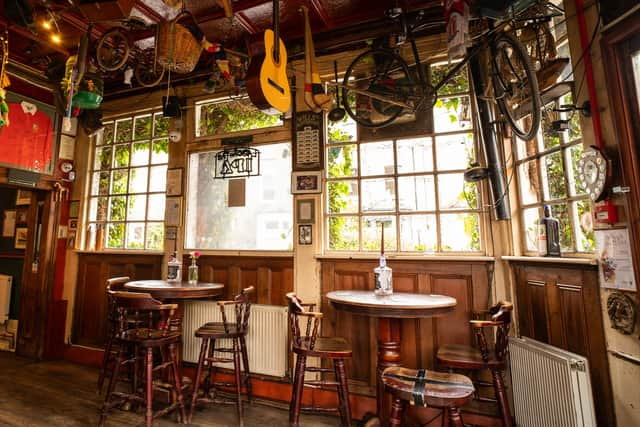The jibes about Keir Starmer being a member of the capital’s metropolitan elite have dogged him ever since he became Labour leader.
Boris Johnson revelled in calling him a “lefty Islington lawyer” (despite having himself lived in Islington for years). Liz Truss used her first PMQs to say that while the Tories had had three female PMs, Labour couldn’t find a leader who wasn’t from north London. Even Rishi Sunak has tried it on recently, claiming his opponent “rarely leaves north London”.
In Leeds today for the launch of Gordon Brown’s “Commission on the UK’s Future”, Starmer repeatedly stressed just how fond he was of getting out of the capital. “Whether it’s Burnley, Hull, Blackpool, Stirling, Sunderland, Southampton, everybody I meet…say ‘we want our place to be even better than it is, we just need a government that shares our ambition,” he said.
That desire to play up his non-London credentials (he stressed today he spent three years at Leeds University) may be seem understandable given concerns among some in the north and midlands that he is a “Remainiac” who wanted to overturn their historic vote to quit the EU.
But Starmer sounded sincere when he said that he really did want to let local areas “take back control” of their lives and their country. Away from over-spun chatter about abolishing the House of Lords, the guts of the Brown Commission is a bid to radically devolve power to local areas.
And there is much to like about some of the prospectus on offer. The idea of doing more to help 288 economic “clusters” around the country, each with their specialisms, is a sound one for any government that wants economic growth spread around the nation.
More from Opinion
The report also rightly calls for the end of the current system of “bidding wars” where councils have to beg for a share of a funding pot for everything from bus services to town centre regeneration. Moving more central Government departments out of London can bring skilled jobs to more areas too.
Brown’s more long-term model of three-year grants to town halls is overdue. There are also interesting plans for more “special local legislation”, local input into skills and job centres. Even some tax-raising powers – London controls around 95 per cent of the UK’s tax revenue, and 75 per cent of the UK’s public spending – may help in some cases.
Yet there are some in Labour who believe that “localism” – a concept touted by Tory and Labour politicians alike in recent years – is far from the panacea that some assume. Even though few of them will go on the record, they are not small in number.
In treating “Westminster and Whitehall” as the bogeyman for Britain’s ills, Labour certainly risks buying into the idea of some on the Right that the state itself is incapable of solving our problems. It often suits oppositions to pose as outsiders, even though once they form a government they’re then the establishment they once railed against.
In the United States, it’s a common trope to rail against “Washington”. Here too, the SNP often uses “Westminster” as a term of abuse, and Starmer has slipped into the habit of late. Only today, he said getting out of London was “much more useful than being in Parliament half the time”.
The danger is that such language simply fuels the idea that all MPs, and all parties, are the same, that “Westminster” is somehow “other” from the public – when in fact at its best it is the eloquent representation of hundreds of communities across the land. A similar demonisation of “Whitehall” as conspiring to kill local (indeed any) innovation seems ill-advised too.
Starmer hopes that a Labour government will kill off the Scottish independence argument that no matter how Scotland votes it always gets Tory rule. But implying that a Labour government won’t deliver change seems to fuel that very argument.
He should be acutely aware that the local and the national resentments don’t often go the way he wants. In the Hartlepool by-election, some voters famously blamed Labour’s local politicians for downgrading the hospital and police service – even though it was often Conservative austerity to blame.
One of the main downsides of radical localism is its entrenchment – indeed its encouragement – of the “postcode lottery” effect whereby some people end up with better or worse services than others. When people vote in a national election, do they really want those varied outcomes? That’s highly debatable to say the least.
Central government needs to redistribute funding around the country precisely to make up for local differences (not every council can credibly raise large sums from business taxes or hotel taxes and the like), that’s why fairer funding formulas for councils are vital. Common national standards are key to any “levelling up” too.
Indeed, Labour’s proudest creation, the National Health Service, has the clue in its title. Yes, it’s made up of local trusts and hospitals, but the sense of national endeavour is what makes it so special. Before the NHS’s creation, health care was determined not just by the money in your pocket but by your local area’s fitness to deliver it.
If Labour is ever to deliver a “national care service” for social care, or indeed boost national childcare, that may require some difficult conversations about the extent of local autonomy (Labour’s SureStart was decimated by cuts to council budgets).
And although more local regeneration and growth can stop people from having to move from the area in which they were born to find work, we shouldn’t forget the huge benefits to those who want to broaden their horizons and live in a different part of the country.
Geographic mobility is as important as social mobility, but doesn’t get the praise it deserves. You can be proud of your birthplace but still want to swap the suffocation of small town or village attitudes for the freedom of living in a big city hundreds of miles away. Some of Britain’s smartest start-ups stem from students adopting their place of study as their new home.
Some Labour MPs believe that “localism” could become the equivalent of David Cameron’s “Big Society” – a giving up of the central state in favour of an untested idea that is in vogue with some politicians and think tanks but not the public at large. Even Mayors that have serious powers are elected on low turnouts (42 per cent for London, 34 per cent for Greater Manchester).
When New Labour staged a referendum on a North East regional assembly, people voted 77 per cent against. If any of the new reforms were to promote the balkanisation of Britain, that may prove a true dead end.
The most important point is this is not a zero-sum game. Pride in the local can be matched by pride in the national too. All those England flags that bedeck World Cup stadiums are famous for carrying the names of smaller clubs like Rochdale, Stoke, Swindon, Ipswich: a strong sense both of place and of nationhood.
“I’m a big government man, that’s how Labour gets things done,” is how one MP puts it to me. “If we go around saying central government is the enemy, why should anyone bother to vote for us?” He has a point.
https://news.google.com/__i/rss/rd/articles/CBMihwFodHRwczovL2luZXdzLmNvLnVrL29waW5pb24vdGhlLW5vcnRoLWFuZC1taWRsYW5kcy1uZWVkLW1vcmUtcG93ZXItYnV0LWRldm9sdXRpb24tcmlza3Mtc3VwZXJjaGFyZ2luZy1icml0YWlucy1wb3N0Y29kZS1sb3R0ZXJ5LTIwMTEwODnSAQA?oc=5




